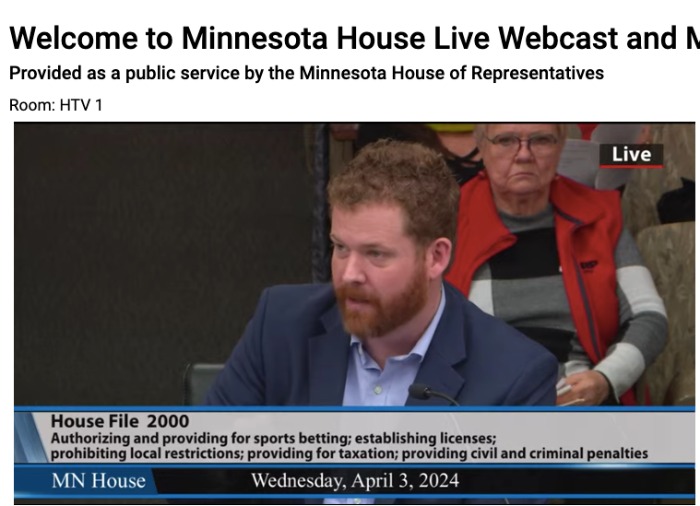Tracks and tribes key sticking points in Minnesota wagering debate

Committee members pushed back on issues including horse racetracks and how to structure a deal for the state’s 11 tribes.
There was no vote, and HF 2000 is currently sitting in the House Taxes Committee awaiting a vote there. But Stephenson, who is the chair of the Commerce Finance and Policy Committee, said he wanted to have an informational session about Minnesota wagering legislation with his committee as the bill moves forward.
Stephenson’s bill, which was carried over from last session, has been heavily amended, including doubling the tax rate and adding in daily fantasy sports regulation. Stephenson also brokered a deal between the state’s charitable gaming foundations and the tribes that is reflected in the latest version of the bill.
But Commerce Finance and Policy Committee members were vocal in their concerns about several issues, including the tracks and what legal wagering will look like on Indian lands. Stephenson made it clear that his bill does not – and will not – include allowing historical horse racing (HHR) at tracks.
HHR is a dealbreaker
“I just want to be clear that in no universe will a bill leave this committee with historical horse racing,” he responded during a line of questioning about how HHR could be considered a game of skill versus chance.
“I’ve left a lot on the table (to discuss) and have given very few redlines, but this is one.”
Representative Ann Neu Brindley also called the $625,000 earmarked for purses at the state’s two racetracks “pennies”.
Instead Stephenson’s bill would further expand the gaming monopoly enjoyed by the state’s tribes, which have previously said they would not support a bill that allows the tracks to have sports betting.
In states where tribes have exclusivity, Indian Country traditionally won’t get behind any legislation that would chip away at that right.

While Stephenson has massaged his proposal over the last four years, the biggest sticking point likely remains how to mollify the horse tracks and allow the tribes to retain exclusivity.
Stephenson: Take sovereignty seriously
Another line of questioning from committee member Tim O’Driscoll involved asking if there was a way to level the playing field for tribes or to dictate how they would partner with commercial operators.
He voiced concern that smaller tribes would not benefit as much as the bigger tribes and suggested that the state legislate revenue sharing among the tribes.
Stephenson shot down the idea, saying that unlike with brick-and-mortar gambling venues, location doesn’t matter. A tribe of any size could partner with an operator of any size, he said.
The best example of this comes from Michigan. When the state legalised online sports betting, the Bay Mills Indian Community, located 350 miles north of Detroit, partnered with DraftKings, the second biggest operator in the country.
Stephenson also said that he does not believe it is up to the legislature to determine how or with whom tribes will partner. They are sovereign nations entitled to make their own decisions, he added.
The bill is one of two moving through the legislature. On the senate side, SF 3803 (previously 1949) has passed through two committees, but remains stalled in State and Local Government and Veterans.
The Minnesota legislative session is set to close on 20 May and there is no crossover deadline.
